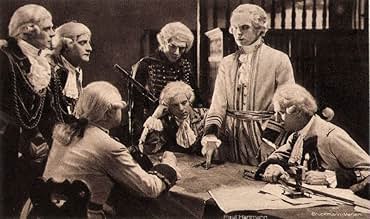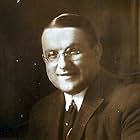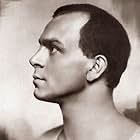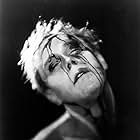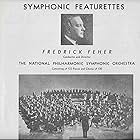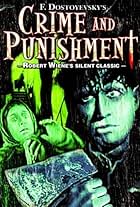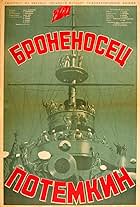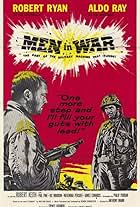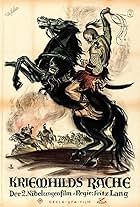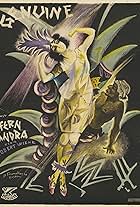While her husband illustrated himself in the war, the Maréchale de Werdenberg took comfort in the arms of the young Octavian and tried to arrange the affairs of his cousin, the Baron Ochs, b... Read allWhile her husband illustrated himself in the war, the Maréchale de Werdenberg took comfort in the arms of the young Octavian and tried to arrange the affairs of his cousin, the Baron Ochs, by introducing him to a young girl.While her husband illustrated himself in the war, the Maréchale de Werdenberg took comfort in the arms of the young Octavian and tried to arrange the affairs of his cousin, the Baron Ochs, by introducing him to a young girl.
Photos
- Director
- Writers
- All cast & crew
- Production, box office & more at IMDbPro
Storyline
Did you know
- ConnectionsVersion of Der Rosenkavalier (1949)
Featured review
From the beginning, silent film showings were not silent; depending on the status of the theatre, different melodies accompanied always those film showings. Coughing or marital discussions together with children howling were the music accompaniment in small theatres of towns without resources; improvised or popular songs were played at the piano in medium theatres in provincial towns; orchestras provided the music in elegant theatres in reputable and important capital cities.
Some important European composers were seduced by the possibilities and importance of the cinema and composed or adapted their own compositions to be played live in those important theatres. This happened with the German composer Herr Richard Strauss who recomposed and adapted his famous and successful opera "Der Rosenkavalier" ( The Knight Of The Rose ) for the screen, capturing the spirit of that musical comedy of three acts, not to mention that the screenplay was written by Herr Hugo von Hofmannsthal, the opera's librettist, and last but not least, the great German director Herr Robert Wiene, directed the film version for the silent screen, three German aces in the same silent project, certainly.
Obviously the German aristocrats prefer to watch ( while catching up on their sleep ) opera at the Opera House and not in a coarse theatre but it must be admitted that this silent film adaptation provides a good vehicle for lazy and modern youngsters to acquaint themselves with such an elegant musical spectacle.
The story: While her husband is becoming famous in the war, the marshal of Werdenberg's wife consoles herself in the arms of the youngster Octavian and tries to arrange the love affairs of her cousin, the baron Ochs, by presenting him to young Sophie. This baron is taken with her and the Marschallin proposes Octavian to be his "Rosenkavalier" in order to present the traditional silver rose to his fiancée. But youngsters are youngsters and sex hormones hold sway over the whole world so for that reason immediately Octavian and Sophie fall in love with each other
This film adaptation of "Der Rosenkavalier" is one of the better of "grandiose" German costume films and Teutonic film operetta. It's an elegant and romantic film beautifully made in artistic terms ( excellent and varied set design, not to mention, obvious soigné costumes ) , technically excellent and wittily made ( flashbacks and a Sibylline use of the ellipsis ) in order to condense and adapt Herr Strauss' opera original story for the screen. This hard task is very well accomplished, summarizing successfully three aristocratic love stories full of love conspiracies and maintaining intact the spirit of the opera on which it was based ( it combines the theatrical and cinema virtues very well ). It does not depend exclusively on its musical spectacle merits but works as an independent and original film production. The many classic court ceremonies and the elegant atmosphere makes for one of those delicious and decadent German exaggerated operettas that the aristocracy likes so much.
"Der Rosenkavalier" was excellently and recently restored by the German-French TV. Channel "ARTE" which reconstructed the missing end of the film with some stills and obviously includes the original Herr Strauss film score. The restored silent film was premiered at Dresden ( that German city that some bad-mannered youngsters blew into pieces sometime ago ) in the "Semperoper", that magnificent Semper Opera House in which in the year 1925 Herr Strauss' "Der Rosenkavalier" made its first stage appearance.
And now, if you'll allow me, I must temporarily take my leave because this German Count must dance a waltz and sing an aria at the same time.
Herr Graf Ferdinand Von Galitzien http://ferdinandvongalitzien.blogspot.com/
Some important European composers were seduced by the possibilities and importance of the cinema and composed or adapted their own compositions to be played live in those important theatres. This happened with the German composer Herr Richard Strauss who recomposed and adapted his famous and successful opera "Der Rosenkavalier" ( The Knight Of The Rose ) for the screen, capturing the spirit of that musical comedy of three acts, not to mention that the screenplay was written by Herr Hugo von Hofmannsthal, the opera's librettist, and last but not least, the great German director Herr Robert Wiene, directed the film version for the silent screen, three German aces in the same silent project, certainly.
Obviously the German aristocrats prefer to watch ( while catching up on their sleep ) opera at the Opera House and not in a coarse theatre but it must be admitted that this silent film adaptation provides a good vehicle for lazy and modern youngsters to acquaint themselves with such an elegant musical spectacle.
The story: While her husband is becoming famous in the war, the marshal of Werdenberg's wife consoles herself in the arms of the youngster Octavian and tries to arrange the love affairs of her cousin, the baron Ochs, by presenting him to young Sophie. This baron is taken with her and the Marschallin proposes Octavian to be his "Rosenkavalier" in order to present the traditional silver rose to his fiancée. But youngsters are youngsters and sex hormones hold sway over the whole world so for that reason immediately Octavian and Sophie fall in love with each other
This film adaptation of "Der Rosenkavalier" is one of the better of "grandiose" German costume films and Teutonic film operetta. It's an elegant and romantic film beautifully made in artistic terms ( excellent and varied set design, not to mention, obvious soigné costumes ) , technically excellent and wittily made ( flashbacks and a Sibylline use of the ellipsis ) in order to condense and adapt Herr Strauss' opera original story for the screen. This hard task is very well accomplished, summarizing successfully three aristocratic love stories full of love conspiracies and maintaining intact the spirit of the opera on which it was based ( it combines the theatrical and cinema virtues very well ). It does not depend exclusively on its musical spectacle merits but works as an independent and original film production. The many classic court ceremonies and the elegant atmosphere makes for one of those delicious and decadent German exaggerated operettas that the aristocracy likes so much.
"Der Rosenkavalier" was excellently and recently restored by the German-French TV. Channel "ARTE" which reconstructed the missing end of the film with some stills and obviously includes the original Herr Strauss film score. The restored silent film was premiered at Dresden ( that German city that some bad-mannered youngsters blew into pieces sometime ago ) in the "Semperoper", that magnificent Semper Opera House in which in the year 1925 Herr Strauss' "Der Rosenkavalier" made its first stage appearance.
And now, if you'll allow me, I must temporarily take my leave because this German Count must dance a waltz and sing an aria at the same time.
Herr Graf Ferdinand Von Galitzien http://ferdinandvongalitzien.blogspot.com/
- FerdinandVonGalitzien
- May 7, 2008
- Permalink
Details
- Runtime1 hour 45 minutes
- Color
- Sound mix
- Aspect ratio
- 1.33 : 1
Contribute to this page
Suggest an edit or add missing content



